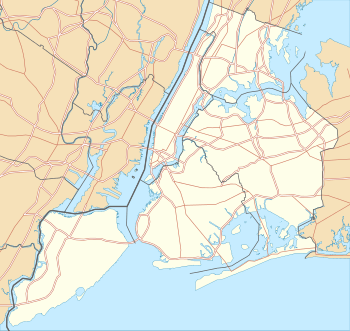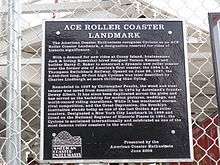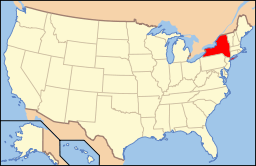Coney Island Cyclone
| Cyclone | |
|---|---|
|
Coney Island Cyclone (2013) | |
| Luna Park, Coney Island | |
| Coordinates | 40°34′30″N 73°58′44″W / 40.57500°N 73.97889°W |
| Status | Operating |
| Opening date | June 26, 1927 |
| Cost | $175,000 |
| Replaced | Giant Racer |
| General statistics | |
| Manufacturer | Great Coasters International |
| Designer | Vernon Keenan |
| Track layout | Compact Twister |
| Lift/launch system | Chain-lift |
| Height | 85 ft (26 m) |
| Drop | 85 ft (26 m) |
| Length | 2,640 ft (800 m) |
| Speed | 60 mph (97 km/h) |
| Inversions | 0 |
| Duration | 2:30 |
| Max vertical angle | 58.6° |
| Capacity | 1440 riders per hour |
| G-force | 3.75 |
| Height restriction | 54 in (137 cm) |
|
Cyclone at RCDB Pictures of Cyclone at RCDB | |
|
Cyclone Roller Coaster | |
   | |
| Location | Brooklyn, New York |
|---|---|
| Coordinates | 40°34′30″N 73°58′44″W / 40.57500°N 73.97889°WCoordinates: 40°34′30″N 73°58′44″W / 40.57500°N 73.97889°W |
| Built | 1927 |
| Architect | Keenan,Vernon; Baker,Harry C. |
| NRHP Reference # | 91000907[1] |
| Added to NRHP | June 25, 1991 |
The Coney Island Cyclone (better known as simply the Cyclone) is a historic wooden roller coaster that opened on June 26, 1927, in the Coney Island section of Brooklyn, New York City. On June 18, 1975, Dewey and Jerome Albert – owners of Astroland Park – entered into an agreement with New York City to operate the ride. Despite original plans by the city to scrap the ride in the early 1970s, the roller coaster was refurbished in the 1974 off-season and reopened on July 3, 1975. Astroland Park continued to invest millions over the years in the upkeep of the Cyclone.[2] After Astroland closed in 2008, Carol Hill Albert, president of Cyclone Coasters, continued to operate it under a lease agreement with the city.[3][4][5] In 2011, Luna Park took over operation of the Cyclone. It was declared a New York City landmark on July 12, 1988, and was placed on the National Register of Historic Places on June 26, 1991.
Description
The track is 2,640 feet (800 m) long (including six fan turns and twelve drops) and a 85-foot (26 m) drop at its highest point; the first drop is at a 58.1 degree angle. Each of the three trains is made up of three eight-person cars, but only one train can run at a time. The ride's top speed is 60 miles per hour and it takes about one minute and fifty seconds. The original roller coaster track that Coney Island Cyclone had was removed and replaced by track made by the company Great Coasters International.
History
Early history
The success of 1925s Thunderbolt and 1926s Tornado led Jack and Irving Rosenthal to buy land at the intersection of Surf Avenue and West 10th Street for a coaster of their own. With a $100,000 investment, they hired leading coaster designer Vernon Keenan to design a new coaster. Harry C. Baker supervised the construction, which was done by area companies including National Bridge Company (which supplied the steel) and Cross, Austin, & Ireland (which supplied the lumber). Its final cost has been reported to be around $146,000 to $175,000. When it opened on June 26, 1927, a ride cost only twenty-five cents, about $3.50 when adjusted for inflation in 2012[6] compared to the actual $10 per ride for the 2016 season.
In 1935, the Rosenthals took over management of Palisades Park. The Cyclone was put under the supervision of Christopher Feucht, a Coney Island veteran who had built a ride called Drop the Dips in 1907, and then doing minor retracking work on it. It continued to be extremely popular; one of its many stories is from 1948, when a coal miner with aphonia visited Coney Island. According to legend, he had not spoken in years but screamed while going down the Cyclone's first drop, saying "I feel sick" as his train returned to the station. He promptly fainted after realizing he had just spoken.[7]
Area decline
By the 1960s, attendance at Coney Island had declined. The crowds were getting more rowdy each season. In 1967 NYC decided that an extension to the New York Aquarium and its wholesome family and educational agenda would be a better use of the Cyclone property. The city started procedures to claim the property by eminent domain. The then owners, East Coaster Corporation, tried to fight the city but lost. During this time they did minimal long-term maintenance, and only enough to keep the ride operating safely. Their last court battle was the compensation for the ride. At one point they measured every beam, girder, and component of the ride to show the cost of materials was higher than the city's proposed compensation.
In 1971, the Cyclone was bought by the City of New York for $1 million. It was operated under contract by East Coaster Corporation while the city worked with the NY Aquarium on plans to redevelop the site. There was a lack of long-term maintenance by the city. In 1972, when the plans to expand the New York Aquarium (which is located adjacent to the ride) were publicly announced, people reacted to the proposed demise of the last Coney Island wooden roller coaster.[8] A successful "Save the Cyclone" campaign ensued and the city changed its plans. The city now owned the Cyclone and leased the operation of the ride in a sealed bid. Astroland amusement park won the bid for $57,000 per year. During the 1974 off-season Astroland's owners had the Cyclone refurbished, and it reopened on July 3, 1975.
In 1977, Richard Rodriguez set a marathon record of 104 hours. Rodriguez was only 19 years old when he broke the record. In June 2013, he broke his own record for the longest marathon on a roller coaster, with 401 hours on the Pepsi Max Big One at Blackpool Pleasure Beach in the United Kingdom.
Preservation
In the 1980s, events such as the Mermaid Parade and Sideshows by the Seashore brought visitors back to Coney Island and the Cyclone. Despite the closing of Astroland Park on September 7, 2008, the Cyclone remained in operation due to its status as a New York City landmark.[9][10] The ride, located on a plot of land measuring 75 feet (23 m) along 834 Surf Avenue and 500 feet (150 m) along West 10th Street, is now owned by the Parks Department. The former concession stands, built into the structure of the roller coaster, were home to the Coney Island History Project,[11] which was moved to a space near the Wonder Wheel. A souvenir stand selling Cyclone based shirts, hats, and on-ride photos remains in the concession stands.
The Cyclone was declared a city landmark in 1988 and a National Historic Landmark in 1991.[12]
Present use

The Cyclone's 70th birthday was celebrated in 1997 with a tightrope walk by Tino Wallenda between the ride's two highest points; that year, a single ride cost $4. In 2011, the adjacent Luna Park had taken over management of the Cyclone, and as of June 2016 it cost $10 to ride and the "reride" policy has been eliminated. Luna Park in 2012 started a major refurbishment of the Cyclone, which is planned to take five years and take place during the off season, allowing for regular season operation. The refurbishment is under control by Great Coasters International. It is an ACE Coaster Classic and Coaster Landmark;[13][14] it has also been honored by baseball's Brooklyn Cyclones as the source for their team name. In 2009, Howie Lipstein was recognized by the Coney Island History Project for riding the Cyclone for fifty consecutive years.[15][16]
Deaths
On May 26, 1985, a 29-year-old man was killed while riding the Cyclone. He stood up and struck his head on a crossbeam.
On August 23, 1988, a 26-year-old man was killed after falling from the Cyclone. The man was a maintenance worker and was the only passenger at the time, riding in the back seat of the train during his lunch break. Apparently, he eluded the safety bar and was seen standing up as the train began its descent down the first hill. He fell 30 feet and landed on a crossbeam of a lower section of track. He was killed instantly. The ride was closed following the incident, but was reopened a day later after safety inspectors concluded that the ride was safe.[17]
On July 31, 2007, a 53-year-old man suffered several crushed vertebrae in his neck while riding the Cyclone. He died four days later after surgery due to complications of his injury. [18][19]
Replications
The popularity of the Cyclone has inspired several replica coasters that share a similar (though not exact) layout (or a mirror version of it). Until 2005, there were four replicas of the Cyclone at Six Flags parks. Two of these have been demolished: the Psyclone at Six Flags Magic Mountain and the Texas Cyclone at Six Flags Astroworld. Two replicas still run, however, and they are the Georgia Cyclone at Six Flags Over Georgia and Viper at Six Flags Great America, both of which are mirror replicas. Overseas, replicas of Cyclone include the Bandit at Movie Park Germany, the White Canyon at Yomiuriland (located in Japan), and the Aska at Nara Dreamland[20] (demolished in 2006), which was also in Japan.
Awards
| Golden Ticket Awards: Top wood Roller Coasters | ||||||||||||||||||
|---|---|---|---|---|---|---|---|---|---|---|---|---|---|---|---|---|---|---|
| Year | 1998 | 1999 | 2000 | 2001 | 2002 | 2003 | 2004 | 2005 | 2006 | 2007 | 2008 | 2009 | 2010 | 2011 | 2012 | 2013 | 2014 | 2015 |
| Ranking | 7[21] | 8[22] | 11[23] | 11[24] | 13[25] | 16[26] | 16[27] | 14[28] | 16[29] | 14[30] | 16[31] | 14[32] | 13[33] | 15[34] | 14[35] | 19[36] | 22[37] | 16[38] |
| Mitch Hawker's Best Roller Coaster Poll: Best Wooden-Tracked Roller Coaster | |||||||||||||||||||||||||||||||||||||||||||||||||||||||||||||||||||||||||||||||||||||||||||||||||||||||||||||||||||||||||||||||||||||||||||||||||||||||||||||||||||||||||||||||||||||||||||||||||||||||||||||||||||||||||||||||||||||||||||||||||||||||||||||||||||||||||||||||||||||||||||||||||||||||||||||||||||||||||||||||||||||||||||||||||||||||||||||||||||||||||||||||||||||||||||||||||||||||||||||||||||||||||||||||||||||||||||||||||||||||||||||||||||||||||||||||||||||||||||||||||||||||||||||||||||
|---|---|---|---|---|---|---|---|---|---|---|---|---|---|---|---|---|---|---|---|---|---|---|---|---|---|---|---|---|---|---|---|---|---|---|---|---|---|---|---|---|---|---|---|---|---|---|---|---|---|---|---|---|---|---|---|---|---|---|---|---|---|---|---|---|---|---|---|---|---|---|---|---|---|---|---|---|---|---|---|---|---|---|---|---|---|---|---|---|---|---|---|---|---|---|---|---|---|---|---|---|---|---|---|---|---|---|---|---|---|---|---|---|---|---|---|---|---|---|---|---|---|---|---|---|---|---|---|---|---|---|---|---|---|---|---|---|---|---|---|---|---|---|---|---|---|---|---|---|---|---|---|---|---|---|---|---|---|---|---|---|---|---|---|---|---|---|---|---|---|---|---|---|---|---|---|---|---|---|---|---|---|---|---|---|---|---|---|---|---|---|---|---|---|---|---|---|---|---|---|---|---|---|---|---|---|---|---|---|---|---|---|---|---|---|---|---|---|---|---|---|---|---|---|---|---|---|---|---|---|---|---|---|---|---|---|---|---|---|---|---|---|---|---|---|---|---|---|---|---|---|---|---|---|---|---|---|---|---|---|---|---|---|---|---|---|---|---|---|---|---|---|---|---|---|---|---|---|---|---|---|---|---|---|---|---|---|---|---|---|---|---|---|---|---|---|---|---|---|---|---|---|---|---|---|---|---|---|---|---|---|---|---|---|---|---|---|---|---|---|---|---|---|---|---|---|---|---|---|---|---|---|---|---|---|---|---|---|---|---|---|---|---|---|---|---|---|---|---|---|---|---|---|---|---|---|---|---|---|---|---|---|---|---|---|---|---|---|---|---|---|---|---|---|---|---|---|---|---|---|---|---|---|---|---|---|---|---|---|---|---|---|---|---|---|---|---|---|---|---|---|---|---|---|---|---|---|---|---|---|---|---|---|---|---|---|---|---|---|---|---|---|---|---|---|---|---|---|---|---|---|---|---|---|---|---|---|---|---|---|---|---|---|---|---|---|---|---|---|---|---|---|---|---|---|---|---|---|---|---|---|---|---|---|---|---|---|---|---|---|---|---|---|---|---|---|---|---|---|---|---|---|---|---|---|---|---|---|---|---|---|---|---|---|---|---|---|---|---|---|
| Year | 1994 | 1995 | 1996 | 1997 | 1998 | 1999 | 2000 | 2001 | 2002 | 2003 | 2004 | 2005 | 2006 | 2007 | 2008 | 2009 | 2010 | 2011 | |||||||||||||||||||||||||||||||||||||||||||||||||||||||||||||||||||||||||||||||||||||||||||||||||||||||||||||||||||||||||||||||||||||||||||||||||||||||||||||||||||||||||||||||||||||||||||||||||||||||||||||||||||||||||||||||||||||||||||||||||||||||||||||||||||||||||||||||||||||||||||||||||||||||||||||||||||||||||||||||||||||||||||||||||||||||||||||||||||||||||||||||||||||||||||||||||||||||||||||||||||||||||||||||||||||||||||||||||||||||||||||||||||||||||||||||||||||||||||||||||
| Ranking | 8 | 15 | 9 (tie) | 12 | 14 | 15 | 23 | 21 | 21 | 21 | 26 | 26 | 36 | 36 | 41 | 41 | 48 | 49 | |||||||||||||||||||||||||||||||||||||||||||||||||||||||||||||||||||||||||||||||||||||||||||||||||||||||||||||||||||||||||||||||||||||||||||||||||||||||||||||||||||||||||||||||||||||||||||||||||||||||||||||||||||||||||||||||||||||||||||||||||||||||||||||||||||||||||||||||||||||||||||||||||||||||||||||||||||||||||||||||||||||||||||||||||||||||||||||||||||||||||||||||||||||||||||||||||||||||||||||||||||||||||||||||||||||||||||||||||||||||||||||||||||||||||||||||||||||||||||||||||
In popular culture
- In 1978, the Cyclone was featured in the film version of The Wiz as the home of its version of the Tinman, and its size compared with the rest of Oz raised to enormous proportions.
- The Cyclone is featured prominently in the 1979 action thriller The Warriors.
- The Cyclone was used in the 1988 action movie Shakedown where Richie Marks (played by Sam Elliott) fights with a hitman while riding it.
- In the movie The Sting II, with Jackie Gleason, a chase scene is used on the loading dock and ride of what appears to be the Cyclone. However, the scene was actually filmed on the Santa Cruz roller coaster, the Giant Dipper. Production had the trains and dock made over to appear identical to the Cyclone.
- The band Mercury Rev made a song about the roller coaster on their debut album Yerself Is Steam.
- The Cyclone made an appearance in the video game Grand Theft Auto IV, but it's called the Screamer. It also appears to be SBNO.
- The Cyclone was mentioned in Captain America: The First Avenger.
- Singer Beyoncé shot a portion of a music video for the song "XO" on the roller coaster in August 2013.
- The band Parachute also featured an image of the Cyclone on their debut album Losing Sleep.
- The Cyclone is mentioned in Girl Meets World episode "Girl Meets Father".
- The Cyclone is mentioned as part of Jerry's day in the Seinfeld episode "The Subway".
- The Cyclone appears in the second season of "Unbreakable Kimmy Schmidt" episode "Kimmy Meets a Drunk Lady"
- Coney Island Cyclone was also featured in the movie Requiem For A Dream but it is not mentioned or interacted with throughout the movie.
- The Cyclone is the subject of the 2015 painting "Cyclones" by the artist, Patrick Harris
References
- ↑ National Park Service (2008-04-15). "National Register Information System". National Register of Historic Places. National Park Service.
- ↑ http://coneyislandcyclone.com/about_us.php
- ↑ Kaminer, Ariel (2010-04-02). "Thrilling Reminder of Old Coney Island". The New York Times.
- ↑ "Brooklyn's Cyclone set to re-open". UPI.com. Retrieved 2012-08-23.
- ↑ http://coneyislandcyclone.com/blog/2010/03
- ↑ "Cyclone 101". The Washington Post. 2002-08-04. Retrieved 2008-09-05.
- ↑ "Britannica Online Encyclopedia". Britannica.com. Retrieved 2012-08-23.
- ↑ John T. McQuiston (1972-03-05). "Aquarium is Getting a Piece of Old Long Island". The New York Times. Retrieved 2008-09-05.
- ↑ Ryan Chatelain (2008-09-05). "End of an ara at Coney Island" (PDF). AM New York. Archived from the original (PDF) on September 15, 2008. Retrieved 2008-09-05.
- ↑ Rich Calder (2007-05-29). "B'klyn Big Top". The New York Post. Retrieved 2008-09-05.
- ↑ Andy Newman (2007-05-29). "Beneath the Speeding Cyclone, a Look Back in Time". The New York Times. Retrieved 2008-09-05.
- ↑ Kristen King (1995-08-04). "Cyclone Honors to Roll". The Daily News. New York. Retrieved 2008-09-05.
- ↑ ACE Coaster Classic Awards
- ↑ ACE Coaster Landmark Awards
- ↑ Monahan, Rachel (April 6, 2009). "A 50-year constant in Coney Island". NYDailyNews.com. Retrieved July 26, 2016.
- ↑ "Howie Lipstein: Devoted Cyclone Rider". Coney Island History Project. April 5, 2009. Retrieved July 26, 2016.
- ↑ "U.S. Roller Coaster Fatalities (1972-1997)".
- ↑ "Coney Island Cyclone Sending Some Riders to Hospital".
- ↑ "Family of man who died after Cyclone ride sues NYC".
- ↑ Nara Dreamland was a theme park designed to replicate the theme of DisneyLand in California. When Disney opened its own park in Japan, Nara Dreamland's attendance suffered until it finally closed in 2006.
- ↑ "Top 25 wood roller coasters" (PDF). Amusement Today: 6B. August 1998. Retrieved September 8, 2013.
- ↑ "Top 25 wood roller coasters" (PDF). Amusement Today: 6B. August 1999. Retrieved September 8, 2013.
- ↑ "Top 25 wood roller coasters" (PDF). Amusement Today. August 2000. Retrieved September 8, 2013.
- ↑ "Top 25 wood roller coasters" (PDF). Amusement Today: 6B. August 2001. Archived from the original (PDF) on October 19, 2013. Retrieved September 8, 2013.
- ↑ "Top 25 wood roller coasters" (PDF). Amusement Today: 6B. September 2002. Archived from the original (PDF) on October 19, 2013. Retrieved September 8, 2013.
- ↑ "Top 50 wood roller coasters" (PDF). Amusement Today: 10–11B. September 2003. Archived from the original (PDF) on October 19, 2013. Retrieved September 8, 2013.
- ↑ "Top 50 wood roller coasters" (PDF). Amusement Today: 14–15B. September 2004. Archived from the original (PDF) on April 3, 2007. Retrieved September 8, 2013.
- ↑ "Top 50 wood roller coasters" (PDF). Amusement Today: 22–23B. September 2005. Archived from the original (PDF) on October 19, 2013. Retrieved September 8, 2013.
- ↑ "Top 50 wood roller coasters" (PDF). Amusement Today: 30–31B. September 2006. Archived from the original (PDF) on October 19, 2013. Retrieved September 8, 2013.
- ↑ "Top 50 wood roller coasters" (PDF). Amusement Today. 11 (6.2): 42–43. September 2007. Archived from the original (PDF) on October 19, 2013. Retrieved September 8, 2013.
- ↑ "Top 50 wood roller coasters" (PDF). Amusement Today. 12 (6.2): 42–43. September 2008. Archived from the original (PDF) on October 19, 2013. Retrieved September 8, 2013.
- ↑ "Top 50 wood roller coasters" (PDF). Amusement Today. 13 (6.2): 38–39. September 2009. Archived from the original (PDF) on October 19, 2013. Retrieved September 8, 2013.
- ↑ "Top 50 wood roller coasters" (PDF). Amusement Today. 14 (6.2): 38–39. September 2010. Archived from the original (PDF) on October 19, 2013. Retrieved September 8, 2013.
- ↑ "Top 50 wood roller coasters" (PDF). Amusement Today. 15 (6.2): 46–47. September 2011. Archived from the original (PDF) on October 19, 2013. Retrieved September 8, 2013.
- ↑ "Top 50 wood roller coasters" (PDF). Amusement Today. 16 (6.2): 46–47. September 2012. Archived from the original (PDF) on April 2, 2015. Retrieved September 8, 2013.
- ↑ "2013 Top 50 wood Roller Coasters" (PDF). Amusement Today. 17 (6.2): 40–41. September 2013. Archived from the original (PDF) on October 19, 2013. Retrieved September 8, 2013.
- ↑ "2014 Top 50 wood Roller Coasters" (PDF). Amusement Today. 18 (6.2): 38–39. September 2014. Retrieved September 8, 2013.
- ↑ "2015 Top 50 wood Roller Coasters" (PDF). Amusement Today. 19 (6.2): 45–46. September 2015. Retrieved September 8, 2013.
External links
| Wikimedia Commons has media related to Coney Island Cyclone. |
| Preceded by Giant Dipper |
World's Fastest Roller Coaster June 1927–April 1976 |
Succeeded by Screamin' Eagle |
_001.jpg)

